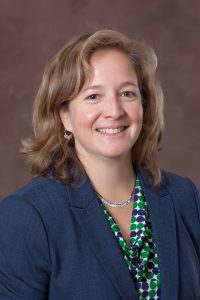A Northern Arizona University faculty member is part of a team that examined the difficulties women continue to face in STEM doctoral programs—difficulties that often drive them away from academic research into friendlier fields.
Melissa Rivers, a part-time faculty member for the community college/higher education program in the Department of Educational Leadership, is a co-author of “Chilly Climates, Balancing Acts, and Shifting Pathways: What Happens to Women in STEM Doctoral Programs,” published in Social Sciences on Jan. 31. She started this research while a doctoral student at Arizona State University, working with the National Science Foundation-sponsored CareerWISE project.
The researchers followed 28 women in science, technology, engineering and mathematics during a period of seven months, asking them to record “incidents in the day-to-day experience of doctoral studies that strengthen or weaken a woman’s construction of her identity as a scientist” and following up with specific questions about those incidents to gauge why they registered as significant. Rivers’ role was to collect the data for the online diary portion, including asking for more clarification and ensuring surveys were completed. She also analyzed that data.
The incidents reported were mostly ones of reactions to adversity, both good and bad. Several women talked about finally working through a difficult test and the satisfaction and belonging they felt in their fields or instances when their peers, including those who know them and those who didn’t, praised or cited their work. Many cited presentations and publications as moments that defined their roles as scientists. They talked about mentors and supportive advisers.
But the women also reported the less glowing moments, ranging from being expected to do the lab “housework” to being left out of discussions about their research, after-work happy hours and conferences to having to deal with sexual harassment, being screamed at or having their research dismissed. Beyond that, several participants described working in a masculine-centric environment as well as having to consider issues like considering children while also trying to finish a dissertation. All of this happened in mostly male environments; few had female mentors, research advisers or in some cases, coworkers.

“I wasn’t surprised by the results,” Rivers said. “Previous studies on validation supported our findings of participants’ confidence being built through being recognized by others verbally and through publications. The number of reported incidences of microaggressions, sexual harassment and sexism in our data were shocking, but not surprising. As an educator, I know these issues and incidents are not isolated to STEM fields.”
The findings from this qualitative study parallel findings in quantitative studies: that women are awarded fewer than 25 percent of the doctoral degrees in physical sciences and engineering, hold disproportionately fewer tenured faculty positions in STEM and far fewer positions of prestige and power and are more likely to opt for teaching positions and working in industry than doing academic research.
Few reports have focused specifically on what happens during doctoral studies, a time when following many years of coursework and preparation, women’s science identity matures, or disintegrates, and her career goals become intentions. This present study provides a unique view of women’s experiences during this pivotal period, in their own words and as they occur, to better understand the gender and social institutional conditions of graduate student life for women in STEM.
This research is a little from Rivers’ typical focus—understanding different pathways and struggles students and administrators face in helping students transitioning from high school to college—but the study examined a few different facets of understanding power, privilege and equity, which is critical to her work.
What she found most surprising, Rivers said, was the chilly reception the study initially received.
“We submitted the manuscript to various publications and were told the research topic was not significant because the number of women in STEM fields had increased and the findings were not different than studies published in the 1980s,” Rivers said. “This further validated how there are still those in academe who refuse to believe overt sexism still occurs.”



